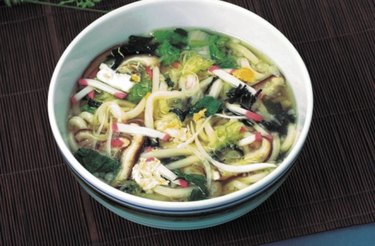
Adhering to a proper diet after a bowel resection is an essential component on your path to recovery. The bowel is a term used to collectively refer to the large and small intestines. A surgical resection of the intestines is typically performed if the bowels are infarcted, obstructed, perforated, inflamed, bleeding, infected or contain cancerous lesions.
Soft Foods
Video of the Day
Post-surgery, your diet will consist mostly of soft, easily digestible foods to avoid irritation of the bowels. Good food choices include yogurt, cottage cheese, soup, rice, pasta, eggs, tender cuts of meat, peanut butter, cooked vegetables, soft fruit, ice cream, gelatin and pudding. Meals should be small and consumed approximately every 2 to 3 hours throughout the day to avoid overloading the intestines. You typically remain on this diet for about 2 to 8 weeks following your surgery. After this time, you may slowly progress to a normal diet, provided you are able to tolerate soft foods.
Video of the Day
Fiber Content
Since fiber is difficult to digest, a low-fiber diet is recommended immediately after your surgery. The fiber content of your diet will be gradually increased as your bowels tolerate more fiber. At first you may experience an increase in loose stools, as fiber tends to promote loose stools. In fact, loose stools are normal in the first several weeks after your surgery. If you experience this side effect, reduce the amount of fiber in your diet until your bowels become accustomed to fiber-rich foods.
Foods to Avoid
For the first several weeks after surgery, it is best to avoid foods that are irritating to the intestines, such as those that are associated with excessive gas production, high in fiber, spicy or fried, as well as raw vegetables, tough cuts of meat, seeds and nuts. Foods that tend to increase gas include beans, broccoli, cabbage, cauliflower peas. High fiber foods you should avoid include whole wheat, oats, bran, barley, rye and pumpernickel. In addition to tough cuts of meat, you should avoid smoked meats, fatty cuts of meat and sausage, as well. You should cook and puree vegetables in a food processor if possible. Raw fruit is acceptable as long as it is soft and the skin is peeled. Dried fruits, candied fruits, citrus fruits and ripe bananas, however, are not recommended.
Beverages
Adequate consumption of fluids will discourage unwanted side effects of a high-fiber diet such as bloating and gas. To avoid these effects, drink at least eight, 8-oz. glasses of fluids a day. Water, milk, non-citrus fruit juices and decaffeinated tea are all good choices that are non-irritating to the bowels. Avoid drinking caffeinated drinks, carbonated drinks, citrus fruit juices, alcohol, chocolate drinks or coffee after surgery. You should also consume beverages from a straw to minimize excessive intake of air, which can also lead to bloating and gas.
Considerations and Complications
The exact diet plan prescribed by your doctor may vary according to your nutritional needs. Your nutritional needs are determined by the portion of bowel resected, as well as any complications you encounter after surgery. One of the risks following a resection of the small intestines is short bowel syndrome. The signs and symptoms of short bowel syndrome depend on the portion of the bowel resected, but generally include diarrhea, malnutrition and malabsorption. For example, resection of the distal portion of the small intestines, known as the ileum, may require a medication to bind with fats in your intestines, as the ileum is responsible for the absorption of fats.
- Oregon Surgical Specialists; Soft Diet after Colon Resection; October 2008
- University of Wisconsin School of Medicine and Public Health; Home Care after Bowel Resection; June 2007
- “Canadian Medical Association”; Short Bowel Syndrome: A Nutritional and Medical Approach; Dr. Khursheed N. Jeejeebhoy; May 2002
- NYU Medical Center; Bowel Resection; February 2000
- Cedars-Sinai; High and Low Fiber Diets; Nancy Ling
Is this an emergency? If you are experiencing serious medical symptoms, please see the National Library of Medicine’s list of signs you need emergency medical attention or call 911.